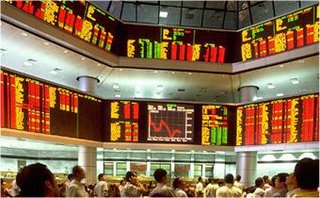He noted that foreign institutional investors were the net buyers on Bursa, accounting for 35% of last year’s daily volume. If that is the case, the local investors should make up the remaining 65% of the volume. So, how can he say local investors are waiting on the sidelines? Unless he has statistic which shows that out of the 65%, only a single digit or a small portion of it consists of local investors. Or maybe the majority of the 65% of the volume were actually played by government financial institution such as PNB (Permodalan Nasional Berhad) or EPF (Employees Provident Fund).
 Why is he so worry about this local investors’ participation? Considering the record-breaking Composite Index and the over 1-billion daily volume, he should be smiling as these two indicators are what Malaysia stock market saw during the 1993 super bull-run. If indeed 35% of the volume came from foreign investors, it’s already a good figure showing foreign investors’ confidence in Malaysia equity market which should be front-paged on daily basis out of pride. If the majority of the remaining 65% volume were from local investors, then he shouldn’t cries asking for more.
Why is he so worry about this local investors’ participation? Considering the record-breaking Composite Index and the over 1-billion daily volume, he should be smiling as these two indicators are what Malaysia stock market saw during the 1993 super bull-run. If indeed 35% of the volume came from foreign investors, it’s already a good figure showing foreign investors’ confidence in Malaysia equity market which should be front-paged on daily basis out of pride. If the majority of the remaining 65% volume were from local investors, then he shouldn’t cries asking for more.
Unless, or course something is not right about the whole bullishness of the stock market. Perhaps the 35% of foreign investors’ participation is not true. Perhaps the Composite Index was up because of a call from government to EPF or PNB to counter-criticism that Malaysia stock market lagged behind too much compare to regional bourses. EPF with its’ hundreds of billions ringgit in employees fund is the richest institution in Malaysia. If you compare the trend today against the 1993 bull-run, you cannot miss the picture where the market then was bull in totality – second liners and even third liners were snatched-up like there’s no tomorrow while second-board companies rarely saw stocks with less than 1 (one) ringgit a share. But now if you look at the top-20 active stocks in Malaysia stock exchange, you’ll notice about 70% of the stocks are trading below one ringgit (though the volume is high).
Could it be that local investors are smarter nowadays after being trapped by numerous false-bulls previously? Could it be that most of these local investors who were trapped are instead waiting for their portfolios to break-even before cashing-out? Could it be that most of these local investors are dominated with “fear” emotionally? Not everyone has a money-printing machine at home to enable them to keep on buying in the stock exchange.
The fact remains that majority of local investors are targeting cheap (known as second or third liners) stocks in Malaysia as blue-chips are still considered expensive (though the trading lots have been brought down to 100 shares instead of 1,000 shares previously). Local investors just like the feeling of holding 50,000 cheap shares compare to 500 blue-chips shares due to the perception that when the cheap stocks explode, the ROI (return on investment) could be in hundreds of percentage points. So, is the stock market bullishness artificial?
Other Articles That May Interest You …

|
|
January 23rd, 2007 by financetwitter
|


|

|

|

|

|

|
Comments
it could be … but i reckon only starter/newcomer will give the unit trust a try … season players who’ve been in the market will definitely want to invest on their own …
ever heard of the saying that investing unit-trust is for the dummy? … because you’re giving away your hard-earned money to someone else (the unit trust might allocate your money to a trainee under their supervision) without knowing the actual person’s capability to invest …
hey you can’t sue unit trust if they make a loss in their investment with your money, can you? … furthermore their own profit are guarantee thru commissions (win ot lose) …
cheers …




























I wonder if it’s a possibility that one of the reasons for the apparent lack of retail participation in the market is that a large number of them may have given up investing on their own (perhaps many of the retailers got burnt once too often)and instead placed their money into Unit Trusts and let others manage their money?
Perhaps the Unit Trust companies and their sales people have done their job all too well and have successfully persuaded a great many people to invest via unit trusts instead of picking stocks themselves.
This may be the current situation. I have a feeling that at a later date when unit trust investors discover that their investments take too long to show a profit (maybe due to the front load and management fees) they may well abandon unit trusts and return to investing directly in stocks themselves.